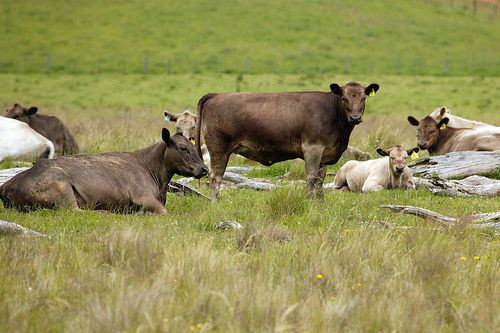Could E. Coli Vaccines For Cows Reduce Human Infection Rates?

Cows that receive E. coli (Escherichia coli) vaccines could reduce human infections by as much as 85 percent, according to a recent British study, which is a rate far higher than previous estimates had suggested.
Prior research asserted cutting the E. coli presence among cows could reduce human infections by 50 percent, but researchers now claim the actual rate is somewhere near 85 percent, given the consideration of a process known as “super-shedding.”
"As far as we can assess, the major risk to humans is from those animals that are shedding the bug heavily," said Stuart Reid, senior study author and a principal at the Royal Veterinary College at the University of London. "If the vaccine has an impact on these animals at that time, the risk to humans is disproportionately reduced."
Cows typically spread the bacteria through their feces in a process known as “super-shedding,” which takes place when the animal plays host to particularly large amounts of bacteria in its gut and subsequently releases them as waste. Controlling for the cultures of E. coli that live in cows, with the vaccine designed for them, ultimately strips the waste product of the bacteria, which is harmless to cows but potentially deadly to humans.
The infectious bacteria can wreak havoc on a person’s gastrointestinal system, causing severe stomach cramps, diarrhea, vomiting, and severe kidney failure, which can lead to death. In cows, the bacteria pose no threat, according to Mike Doyle, a distinguished professor of food microbiology and director of the Center for Food Safety at the University of Georgia. Because of this, farmers often see no incentive to vaccinate their cows purely for extrinsic health benefits.
"The farmer doesn't get any bang for the buck from a production perspective," Doyle told HealthDay, noting the farmer sees no competitive benefit from preventing the bacteria’s presence. "The vaccine doesn't help the animal grow more healthy."
To evaluate the potential effects of vaccinating cows, the researchers looked at the genetic marker associated with E. coli super-shedding in cows. They then drew a link between the E. coli in those cows, which were predisposed to super-shed, and outbreaks of human illness. Ultimately, they concluded that the types of E. coli tied to super-shedding caused the majority of illnesses in humans.
The health risks of doing nothing give Dr. Louise Matthews, a senior research fellow at the University of Glasgow's Institute of Biodiversity, sizable concern about enforcing cow vaccinations.
"Treating cattle in order to reduce the number of human cases [of E. Coli] certainly makes sense from a human health perspective,” she said, “And while more work is needed to calculate the cost of a vaccination program, the public health justification must be taken seriously.”
People may end up taking such a vaccination program too seriously, one expert argued. If cows begin receiving E. coli vaccines, people could begin to undervalue the importance of observing sanitary food handling. Dr. Georges Benjamin, executive director of the American Public Health Association, said the programs may cause people to become too lax about proper cleanliness in the kitchen, a potent threat given that ground beef contains the greatest concentrations of the bacteria.
Last year, nearly 1,100 confirmed cases of E. coli infection occurred in the U.S., which led to 275 hospitalizations and two deaths, according to the Centers for Disease Control and Prevention. For every reported case of E. coli, there are an estimated 26 that go unreported.
"I do want to emphasize [that] it does not replace careful monitoring of animal health and surveillance of the food-safety process as animals move through the pipeline to become our food," Benjamin said. "It also doesn't replace good food safety. You're still going to have to wash your hands. You're still going to have to make sure your food is prepared properly."
Source: Matthews L, Reeve R, Gally D. Predicting the public health benefit of vaccinating cattle against Escherichia coli O157. PNAS. 2013.



























